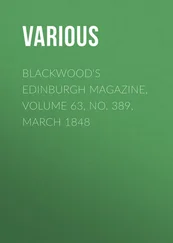Various - Blackwood's Edinburgh Magazine, No. 401, March 1849
Здесь есть возможность читать онлайн «Various - Blackwood's Edinburgh Magazine, No. 401, March 1849» — ознакомительный отрывок электронной книги совершенно бесплатно, а после прочтения отрывка купить полную версию. В некоторых случаях можно слушать аудио, скачать через торрент в формате fb2 и присутствует краткое содержание. Издательство: Иностранный паблик, Жанр: periodic, foreign_edu, Путешествия и география, на английском языке. Описание произведения, (предисловие) а так же отзывы посетителей доступны на портале библиотеки ЛибКат.
- Название:Blackwood's Edinburgh Magazine, No. 401, March 1849
- Автор:
- Издательство:Иностранный паблик
- Жанр:
- Год:неизвестен
- ISBN:нет данных
- Рейтинг книги:4 / 5. Голосов: 1
-
Избранное:Добавить в избранное
- Отзывы:
-
Ваша оценка:
- 80
- 1
- 2
- 3
- 4
- 5
Blackwood's Edinburgh Magazine, No. 401, March 1849: краткое содержание, описание и аннотация
Предлагаем к чтению аннотацию, описание, краткое содержание или предисловие (зависит от того, что написал сам автор книги «Blackwood's Edinburgh Magazine, No. 401, March 1849»). Если вы не нашли необходимую информацию о книге — напишите в комментариях, мы постараемся отыскать её.
Blackwood's Edinburgh Magazine, No. 401, March 1849 — читать онлайн ознакомительный отрывок
Ниже представлен текст книги, разбитый по страницам. Система сохранения места последней прочитанной страницы, позволяет с удобством читать онлайн бесплатно книгу «Blackwood's Edinburgh Magazine, No. 401, March 1849», без необходимости каждый раз заново искать на чём Вы остановились. Поставьте закладку, и сможете в любой момент перейти на страницу, на которой закончили чтение.
Интервал:
Закладка:
How would the Scriptores Rei Rusticæ have gained in usefulness in their own time, how immensely in interest in ours, had they been accompanied by such illustrations as these! The clearness of Columella would have been made more transparent, the obscurity of Palladius lessened; and Cato and Varro would have preserved to us the actual living forms, and costumes, and instruments of the ancient Etruscan times, more clearly than the painted tombs are now revealing to the antiquarian the fashions of their feasts, and games, and funereal rites. We have before us the singularly, richly, and extravagantly, yet graphically and most instructively illustrated book of Georgius Agricola, De Re Metallica (Basil, 1621.) The woodcuts of the Book of the Farm have induced us to turn it up, and it is with ever new admiration that we turn over its old leaves. It has to us the interest of a child's picture-book; and though, as a chef-d'œuvre of illustrative art, the three hundred woodcuts of Stephens do not approach the book of Agricola, yet what a treasure would the work of Ausonius Popma on the rural implements of the ancients – their instrumenta in its widest sense – have been to us, could it have been illustrated when he wrote (1690) in the style of Agricola, and with the minuteness and fulness of Stephens!
The same desire to render minutely intelligible the whole subject treated of, which these woodcuts show, is manifested in the more solid letterpress of the book. It was said of Columella, by Matthew Gessner, that he discoursed "non ut argumentum simplex quod discere amat, dicendo obscuret, sed ut clarissimâ luce perfundat omnia." Such, the reader feels, must have been the aim of the author of this book. In his descriptions, nothing appears to be omitted; nothing is too minute to be passed over. His book exposes not merely the every-day life, but the very inmost life – the habits, and usages, and instruments of the most humble as well as the most important of the operations of the domestic, equally with the field economy of rural life. We do not know if its effects upon our town population will ever be such as Beza ascribes to that of Columella —
Tu vero, Juni, silvestria rura canendo,
Post te ipsas urbes in tua rura trahis;
but certainly, with a few more woodcuts, it would, in minute and graphic illustration, by prints and letterpress be a most worthy companion to the work of Agricola.
The plan of the book is to give a history of the agricultural year, after the manner of the Roman Palladius and our own old Tucker; and the present volume embraces the operations of the skilful farmer in every kind of husbandry during the winter and spring. But, before we come to the heart of the book, hear what Mr Stephens says about the agricultural learning of our landed gentry: —
"Even though he devote himself to the profession of arms or the law, and thereby confer distinction on himself, if he prefer either to the neglect of agriculture he is rendering himself unfit to undertake the duties of a landlord. To become a soldier or a lawyer, he willingly undergoes initiatory drillings and examinations; but to acquire the duties of a landlord before he becomes one, he considers it quite unnecessary to undergo initiatory tuition. These, he conceives, can be learned at any time, and seems to forget that the conducting of a landed estate is a profession, as difficult of thorough attainment as ordinary soldiership or legal lore. The army is an excellent school for confirming, in the young, principles of honour and habits of discipline; and the bar for giving a clear insight into the principles upon which the rights of property are based, and of the relation betwixt landlord and tenant; but a knowledge of practical agriculture is a weightier matter than either for a landlord, and should not be neglected.
"One evil arising from studying those exciting professions before agriculture is, that, however short may have been the time in acquiring them, it is sufficiently long to create a distaste to learn agriculture afterwards practically – for such a task can only be undertaken, after the turn of life, by enthusiastic minds. But as farming is necessarily the profession of the landowner, it should be learned, theoretically and practically, before his education is finished. If he so incline, he can afterwards enter the army or go to the bar, and the exercise of those professions will not efface the knowledge of agriculture previously acquired. This is the proper course, in my opinion, for every young man destined to become a landowner to pursue, and who is desirous of finding employment as long as he has not to exercise the functions of a landlord. Were this course invariably pursued, the numerous engaging ties of a country life would tend in many to extinguish the kindling desire for any other profession. Such a result would be most advantageous for the country; for only consider the effects of the course pursued at present by landowners. It strikes every one as an incongruity for a country gentleman to be unacquainted with country affairs. Is it not strange that he should require inducements to learn his hereditary profession, – to become familiar with the only business which can enable him to enhance the value of his estate, and increase his income? Does it not infer infatuation to neglect becoming well acquainted with the condition of his tenants, by whose exertions his income is raised, and by which knowledge he might confer happiness on many families, and in ignorance of which he may entail lasting misery on many more? It is in this way too many country gentlemen neglect their moral obligations.
"It is a manifest inconvenience to country gentlemen, when taking a prominent part in county matters without a competent knowledge of agriculture, to be obliged to apologise for not having sufficiently attended to agricultural affairs. Such an avowal is certainly candid, but is anything but creditable to those who have to make it. When elected members of the legislature, it is deplorable to find so many of them so little acquainted with the questions which bear directly or indirectly on agriculture. On these accounts, the tenantry are left to fight their own battles on public questions. Were landowners practically acquainted with agriculture, such painful avowals would be unnecessary, and a familiar acquaintance with agriculture would enable the man of cultivated mind at once to perceive its practical bearing on most public questions."
And what he says respectively of the ignorant and skilful factor or agent is quite as deserving of attention. Not merely whole estates, but in some parts of the island, whole counties lag in arrear through the defective education and knowledge of the agents as a class: —
"A still greater evil, because less personal, arises on consigning the management of valuable estates to the care of men as little acquainted as the landowners themselves with practical agriculture. A factor or agent, in that condition, always affects much zeal for the interest of his employer. Fired by it, and possessing no knowledge to form a sound judgment, he soon discovers something he considers wrong among the poorer tenants. Some rent perhaps is in arrear – the strict terms of the lease have been deviated from – the condition of the tenant seems declining. These are favourable symptoms for a successful contention with him. Instead of interpreting the terms of the lease in a generous spirit, the factor hints that the rent would be better secured through another tenant. Explanation of circumstances affecting the actual condition of the farm, over which he has, perhaps, no control, – the inapplicability, perhaps, of peculiar covenants in the lease to the particular circumstances of the farm – the lease having perhaps been drawn up by a person ignorant of agriculture, – are excuses unavailingly offered to a factor confessedly unacquainted with country affairs, and the result ensues in disputes betwixt him and the tenant. To explanations, the landlord is unwilling to listen, in order to preserve intact the authority of the factor; or, what is still worse, is unable to interfere, because of his own inability to judge of the actual state of the case betwixt himself and the tenant, and, of course, the disputes are left to be settled by the originator of them. Thus commence actions at law, – criminations and recriminations, – much alienation of feeling; and at length a proposal for the settlement of matters, at first perhaps unimportant, by the arbitration of practical men. The tenant is glad to submit to an arbitration to save his money; and in all such disputes, being the weaker party, he suffers most in purse and character. The landlord, who ought to have been the protector, is thus converted into the unconscious oppressor of his tenant.
Читать дальшеИнтервал:
Закладка:
Похожие книги на «Blackwood's Edinburgh Magazine, No. 401, March 1849»
Представляем Вашему вниманию похожие книги на «Blackwood's Edinburgh Magazine, No. 401, March 1849» списком для выбора. Мы отобрали схожую по названию и смыслу литературу в надежде предоставить читателям больше вариантов отыскать новые, интересные, ещё непрочитанные произведения.
Обсуждение, отзывы о книге «Blackwood's Edinburgh Magazine, No. 401, March 1849» и просто собственные мнения читателей. Оставьте ваши комментарии, напишите, что Вы думаете о произведении, его смысле или главных героях. Укажите что конкретно понравилось, а что нет, и почему Вы так считаете.












